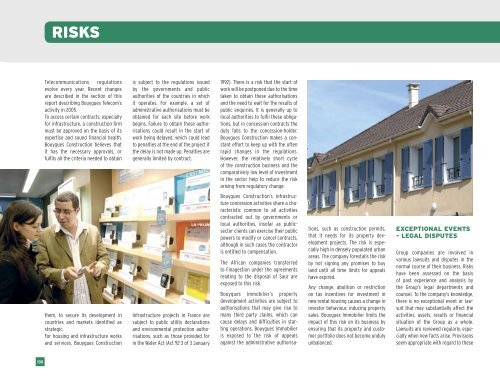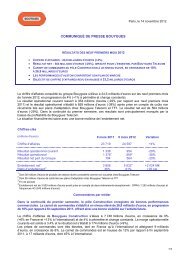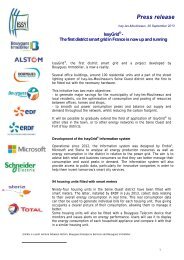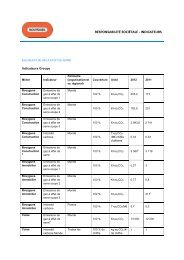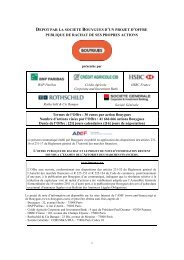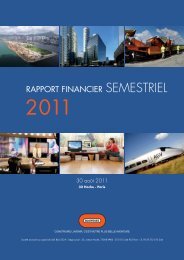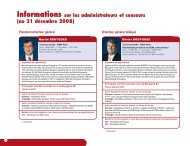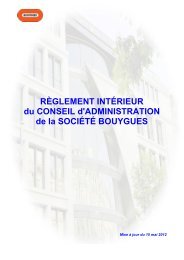A N N U A L R E P O R T - Bouygues
A N N U A L R E P O R T - Bouygues
A N N U A L R E P O R T - Bouygues
Create successful ePaper yourself
Turn your PDF publications into a flip-book with our unique Google optimized e-Paper software.
RISKS<br />
Telecommunications regulations<br />
evolve every year. Recent changes<br />
are described in the section of this<br />
report describing <strong>Bouygues</strong> Telecom’s<br />
activity in 2005.<br />
To access certain contracts, especially<br />
for infrastructure, a construction firm<br />
must be approved on the basis of its<br />
expertise and sound financial health.<br />
<strong>Bouygues</strong> Construction believes that<br />
it has the necessary approvals, or<br />
fulfils all the criteria needed to obtain<br />
is subject to the regulations issued<br />
by the governments and public<br />
authorities of the countries in which<br />
it operates. For example, a set of<br />
administrative authorisations must be<br />
obtained for each site before work<br />
begins. Failure to obtain these authorisations<br />
could result in the start of<br />
work being delayed, which could lead<br />
to penalties at the end of the project if<br />
the delay is not made up. Penalties are<br />
generally limited by contract.<br />
1992). There is a risk that the start of<br />
work will be postponed due to the time<br />
taken to obtain these authorisations<br />
and the need to wait for the results of<br />
public enquiries. It is generally up to<br />
local authorities to fulfil these obligations,<br />
but in concession contracts the<br />
duty falls to the concession-holder.<br />
<strong>Bouygues</strong> Construction makes a constant<br />
effort to keep up with the often<br />
rapid changes in the regulations.<br />
However, the relatively short cycle<br />
of the construction business and the<br />
comparatively low level of investment<br />
in the sector help to reduce the risk<br />
arising from regulatory change.<br />
them, to secure its development in<br />
countries and markets identified as<br />
strategic.<br />
For housing and infrastructure works<br />
and services, <strong>Bouygues</strong> Construction<br />
Infrastructure projects in France are<br />
subject to public utility declarations<br />
and environmental protection authorisations,<br />
such as those provided for<br />
in the Water Act (Act 92-3 of 3 January<br />
<strong>Bouygues</strong> Construction’s infrastructure<br />
concession activities share a characteristic<br />
common to all activities<br />
contracted out by governments or<br />
local authorities, insofar as publicsector<br />
clients can exercise their public<br />
powers to modify or cancel contracts,<br />
although in such cases the contractor<br />
is entitled to compensation.<br />
The African companies transferred<br />
to Finagestion under the agreements<br />
relating to the disposal of Saur are<br />
exposed to this risk.<br />
<strong>Bouygues</strong> Immobilier’s property<br />
development activities are subject to<br />
authorisations that may give rise to<br />
many third party claims, which can<br />
cause delays and difficulties in starting<br />
operations. <strong>Bouygues</strong> Immobilier<br />
is exposed to the risk of appeals<br />
against the administrative authorisa-<br />
tions, such as construction permits,<br />
that it needs for its property development<br />
projects. The risk is especially<br />
high in densely populated urban<br />
areas. The company forestalls the risk<br />
by not signing any promises to buy<br />
land until all time limits for appeals<br />
have expired.<br />
Any change, abolition or restriction<br />
on tax incentives for investment in<br />
new rental housing causes a change in<br />
investor behaviour, inducing property<br />
sales. <strong>Bouygues</strong> Immobilier limits the<br />
impact of this risk on its business by<br />
ensuring that its property and customer<br />
portfolio does not become unduly<br />
unbalanced.<br />
EXCEPTIONAL EVENTS<br />
- LEGAL DISPUTES<br />
Group companies are involved in<br />
various lawsuits and disputes in the<br />
normal course of their business. Risks<br />
have been assessed on the basis<br />
of past experience and analysis by<br />
the Group’s legal departments and<br />
counsel. To the company’s knowledge,<br />
there is no exceptional event or lawsuit<br />
that may substantially affect the<br />
activities, assets, results or financial<br />
situation of the Group as a whole.<br />
Lawsuits are reviewed regularly, especially<br />
when new facts arise. Provisions<br />
seem appropriate with regard to these<br />
100


